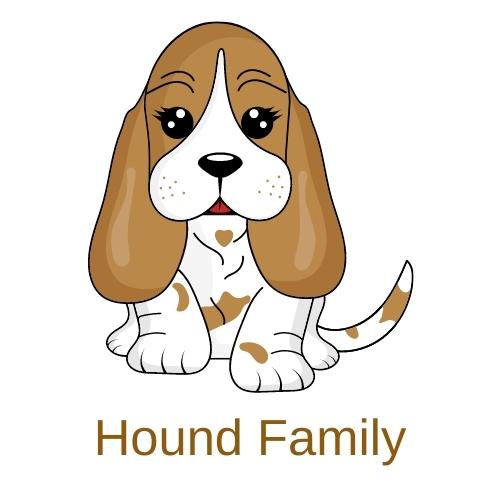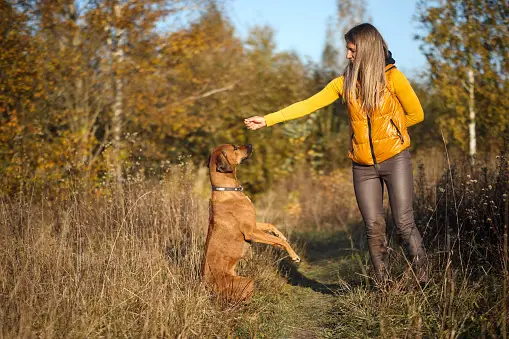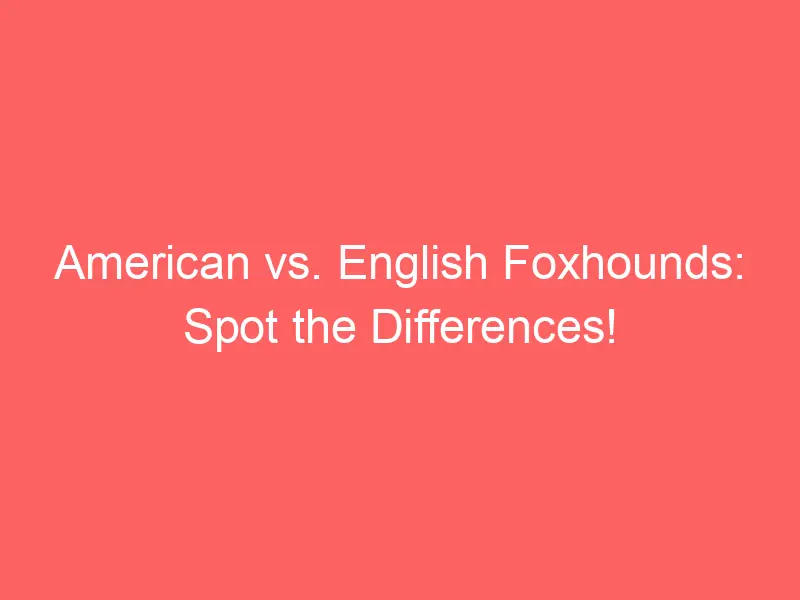Introduction to Family-Friendly Hound Dogs

When it comes to choosing a family pet, hound dogs often top the list. These loyal, friendly, and intelligent dogs make excellent companions for families of all sizes. Let’s delve into why hound dogs are such a great choice for families and explore some common characteristics of these beloved breeds.
-
- Why hound dogs are great for families
Hound dogs are known for their friendly and sociable nature, making them an excellent choice for families with children. They are patient, gentle, and often form strong bonds with their human families. Hound dogs are also known for their intelligence and trainability, making them easy to integrate into a family setting. They love to play and are often quite active, which can be a great way for kids to burn off some energy. Additionally, hound dogs are typically healthy breeds, meaning they can be a part of your family for many years to come.
-
- Common characteristics of hound dogs
While there are many different breeds of hound dogs, they all share some common characteristics. Hound dogs are typically medium to large in size and have a strong, muscular build. They have a keen sense of smell and are often used for hunting or tracking. Hound dogs are also known for their endurance and stamina, making them great companions for active families. They are generally easy to train and are known for their loyalty and devotion to their families. Hound dogs also have a calm and gentle demeanor, making them great for families with children.
In conclusion, hound dogs are a fantastic choice for families due to their friendly nature, intelligence, and adaptability. Their common characteristics make them well-suited to family life, and their love for play and activity can bring joy and energy into any home. If you’re considering adding a pet to your family, a hound dog could be the perfect fit.
Top 5 Best Family Hound Dogs
1. Basset Hound
Known for their droopy ears and soulful eyes, Basset Hounds are a popular choice for families. They are one of the most recognizable hound breeds and have a unique set of characteristics that make them stand out.
-
- Characteristics of Basset Hounds
Basset Hounds are medium-sized dogs with a short, muscular body. They have a distinctive long face with droopy ears and deep-set eyes that often give them a sad look. Their coat is short and smooth, and it comes in a variety of colors, including tri-color, black and white, and lemon and white. Basset Hounds are known for their excellent sense of smell, which is second only to the Bloodhound. They are also known for their calm and friendly temperament, making them great companions.
-
- Why Basset Hounds are great for kids
Basset Hounds are known for their gentle and patient nature, which makes them excellent pets for families with children. They are tolerant and affectionate, and they enjoy spending time with their human family members. Basset Hounds are also known for their loyalty and protective nature, which can provide an added sense of security for families. Despite their somewhat sad appearance, Basset Hounds are actually quite playful and enjoy participating in family activities.
Overall, Basset Hounds are a great choice for families looking for a loyal, affectionate, and protective pet. Their unique characteristics and friendly nature make them a beloved addition to any family.
2. Beagle
Beagles are one of the most popular breeds among dog lovers, especially those with families. This breed is known for its friendly nature, intelligence, and adaptability. Let’s delve into the characteristics of Beagles and why they make a perfect fit for families.
-
- Characteristics of Beagles
Beagles are small to medium-sized dogs, typically weighing between 18 and 30 pounds. They have short hair, a square muzzle, and large, expressive brown or hazel eyes that radiate an air of friendliness. Their ears are long and droopy, adding to their adorable charm.
Beagles are known for their keen sense of smell, second only to the Bloodhound. This breed is highly intelligent and curious, which makes them excellent at problem-solving but also means they can be a bit mischievous. Beagles are energetic and require regular exercise to keep them healthy and happy.
One of the most distinctive characteristics of Beagles is their vocalization. They have a unique howl or ‘bay’ which they use when they are excited or on the scent of something interesting. You can learn more about Beagles from the Wikipedia page.
-
- Why Beagles are suitable for families
Beagles are known for their gentle, friendly, and outgoing nature, making them great companions for children. They are sociable dogs that get along well with other pets and are not known to be aggressive. Their size makes them suitable for both large homes and small apartments, as long as they get enough exercise.
Beagles are also known for their loyalty and love for their human families. They enjoy spending time with their owners, whether it’s playing in the backyard or snuggling on the couch. Their intelligence and eagerness to please make them relatively easy to train, although they can be stubborn at times.
However, it’s important to remember that Beagles are pack animals and don’t like to be left alone for long periods. They thrive in an environment where they can interact with their family members regularly. Their friendly and loving nature, combined with their adaptability and moderate size, makes them an excellent choice for families.
3. Bloodhound
Known for their keen sense of smell and tracking abilities, Bloodhounds are a unique breed of hound dogs that have much to offer to families. Let’s delve into their characteristics and understand why they are considered family-oriented.
- Characteristics of Bloodhounds
Bloodhounds are large, powerful dogs with a gentle and friendly demeanor. They have droopy eyes and long, floppy ears that give them a distinctive appearance. Their coat is short and dense, providing protection in all weather conditions. They are available in a variety of colors, including black and tan, liver and tan, and red.
One of the most notable characteristics of Bloodhounds is their extraordinary sense of smell. According to Wikipedia, they have the ability to track scents over great distances, even days later. This makes them excellent search and rescue dogs.
Despite their size, Bloodhounds are known for their patience and good nature. They are generally very gentle and friendly dogs, making them great companions for children. However, they can be stubborn at times, so consistent training is important.
- Why Bloodhounds are family-oriented
Bloodhounds are known for their loyalty and affection towards their family members. They are very protective of their loved ones and will do everything in their power to ensure their safety. This makes them excellent family dogs.
They are also very patient and gentle with children. They enjoy the company of their human family members and are always eager to participate in family activities. Whether it’s a game of fetch in the backyard or a quiet evening in front of the TV, Bloodhounds are always happy to be part of the action.
Despite their size, Bloodhounds are very gentle and are known to be good with children of all ages. They are also known to get along well with other pets. This, combined with their protective nature, makes them an excellent choice for families.
In conclusion, Bloodhounds are not only great trackers but also wonderful family pets. Their gentle nature, combined with their protective instincts, makes them a great addition to any family.
4. Dachshund
The Dachshund, also known as the sausage dog, is a popular breed among families, especially those with children. This breed is known for its unique physical characteristics and its friendly nature towards kids. Let’s delve deeper into the world of Dachshunds.
-
- Characteristics of Dachshunds
Dachshunds are small dogs with a long body and short legs, a characteristic that gives them their distinctive appearance. They come in two sizes: standard and miniature. Standard Dachshunds weigh between 16 to 32 pounds, while the miniature ones weigh less than 11 pounds. They also come in three coat types: smooth, long-haired, and wire-haired, each with its unique charm.
Personality-wise, Dachshunds are known for their lively and playful nature. They are intelligent, brave, and independent, with a bit of stubbornness. They are also known for their strong sense of smell, second only to the Bloodhound. This breed is quite vocal and will alert their family to strangers or potential dangers, making them excellent watchdogs. For more detailed information, you can visit the Dachshund Wikipedia page.
-
- Why Dachshunds are kid-friendly
Dachshunds are known for their friendly and protective nature, making them great companions for children. They are patient and gentle with kids, and their playful nature makes them a fun playmate. However, due to their small size, it’s important to teach children to handle them gently to avoid any injury to the dog.
Moreover, Dachshunds are intelligent and eager to please, which makes them relatively easy to train. They can learn and follow rules quickly, which is beneficial when you have kids around. Their loyalty and protective nature also mean they will look out for their little human friends.
It’s important to note that like any dog breed, Dachshunds need socialization from a young age to ensure they grow up to be well-rounded dogs. Regular interaction with children and other family members will help them develop a strong bond and a friendly attitude.
In conclusion, Dachshunds, with their friendly nature, protective instincts, and unique characteristics, make a great addition to any family, especially those with children. Their size and temperament make them suitable for both apartment living and houses with yards. Remember, a happy Dachshund is one that is well cared for and loved!
5. Coonhound
The Coonhound, a type of hound dog, is known for its exceptional hunting skills and friendly nature. This breed is not only a great companion for hunting enthusiasts but also a wonderful family pet. Let’s delve into the characteristics of Coonhounds and why they make a great addition to families with children.
- Characteristics of Coonhounds
Coonhounds are medium to large-sized dogs, with males standing 22-27 inches tall and females 21-25 inches. They have a muscular build, which contributes to their agility and endurance. Their coats are short and dense, providing protection against harsh weather conditions. They come in a variety of colors, including black, tan, red, and bluetick.
Coonhounds are known for their keen sense of smell, second only to the Bloodhound. This makes them excellent trackers and hunters. They are also known for their unique vocalization, often described as a bay or howl. This breed is intelligent, eager to please, and generally easy to train. However, they can be stubborn at times, so consistent, positive reinforcement training methods work best.
Coonhounds are social dogs who enjoy the company of both humans and other dogs. They are energetic and require regular exercise to keep them healthy and happy. Despite their hunting background, Coonhounds are typically gentle and friendly, making them great pets for families.
- Why Coonhounds are great for children
Coonhounds make excellent family pets, especially for families with children. Their friendly and gentle nature makes them a great companion for kids. They are patient and tolerant, which makes them well-suited to the energetic play of children.
Coonhounds are also protective and will look out for their family members. They are known to form strong bonds with their families, and they enjoy spending time with them, whether it’s playing in the backyard or snuggling on the couch.
However, as with any breed, it’s important to teach children how to interact with dogs respectfully and safely. Supervision is also recommended during interactions between dogs and young children to ensure the safety of both.
In conclusion, the Coonhound’s friendly nature, protective instincts, and love for play make them a great choice for families with children. Their unique characteristics and traits make them not only excellent hunting companions but also lovable family pets.
Hound Dogs and Family Compatibility
Integrating a hound dog into your family is a rewarding experience. These dogs are known for their loyalty, intelligence, and adaptability. However, to ensure a smooth transition and proper training, there are a few key steps to follow.
-
- How to ensure a smooth transition for the hound dog into your family
When bringing a hound dog into your family, it is essential to prepare your home and family members. Start by creating a safe and comfortable space for the dog. This could be a designated room or a specific area in your living room. Make sure to dog-proof your home by removing any small objects that the dog could swallow or chew on.
Introduce the dog to each family member one at a time to avoid overwhelming them. Allow the dog to sniff and get familiar with each person. It’s also important to establish a routine for feeding, walking, and sleeping right from the start. This will help the dog adjust to its new environment.
-
- Tips for training hound dogs
Training a hound dog requires patience and consistency. Start with basic commands like ‘sit’, ‘stay’, and ‘come’. Use positive reinforcement such as treats, praises, or petting to reward good behavior. Avoid punishing the dog as it can lead to fear and aggression.
Remember that hound dogs are intelligent and can get bored easily. So, keep the training sessions short and fun. Incorporate games and toys to keep them engaged. Socializing your hound dog with other dogs and people will also help in their overall development.
In conclusion, hound dogs make excellent family pets. With proper preparation and training, they can easily adapt to their new home and become a beloved member of the family.
Case Studies: Hound Breeds for Families
Let’s take a closer look at how different families have integrated hound breeds into their homes. These case studies provide real-life examples of the joys and challenges of owning a hound dog.
-
Case Study 1: The Smith Family and their Beagle
The Smith family, consisting of two adults and two young children, welcomed a Beagle into their home. Known for their friendly nature and energy, the Beagle quickly became a beloved member of the family. The Smiths found that their Beagle required regular exercise, but its friendly nature made it a great companion for their children. The Smiths also appreciated the Beagle’s moderate size, which made it a good fit for their suburban home. Learn more about Beagles here.
-
Case Study 2: The Johnson Family and their Basset Hound
The Johnson family, a couple in their 50s, chose a Basset Hound as their pet. Known for their calm demeanor and loyalty, the Basset Hound was a perfect match for the Johnsons’ quiet lifestyle. Despite their droopy expressions, Basset Hounds are known to be friendly and patient, making them great companions. The Johnsons found that their Basset Hound required less exercise than other breeds, but still enjoyed daily walks. Learn more about Basset Hounds here.
-
Case Study 3: The Davis Family and their Dachshund
The Davis family, a young couple living in an apartment, decided on a Dachshund as their first pet. Despite their small size, Dachshunds are known for their courage and will stand up to larger dogs without fear. The Davis family found that their Dachshund was a lively and playful addition to their home. They also appreciated the Dachshund’s small size, which was a good fit for their apartment living. Learn more about Dachshunds here.
These case studies highlight the unique characteristics of different hound breeds and how they can fit into various family dynamics. Whether you have young children, live in an apartment, or prefer a quieter lifestyle, there’s a hound breed that can fit into your family.
Key Takeaways: Choosing the Best Hound Dogs for Your Family
Choosing the perfect hound dog for your family is a significant decision. It requires careful thought and understanding of the breed’s characteristics. Here are some key takeaways to help you make the best choice.
-
- Considerations when choosing a hound dog
When selecting a hound dog for your family, consider factors such as the dog’s size, temperament, and energy levels. For instance, larger breeds like the Bloodhound may require more space and exercise than smaller breeds like the Dachshund. Also, consider the dog’s lifespan and any potential health issues. For more information, you can refer to the Hound page on Wikipedia.
-
- Importance of understanding the breed’s characteristics
Each hound breed has unique characteristics. For example, Basset Hounds are known for their keen sense of smell and calm demeanor, while Greyhounds are known for their speed and agility. Understanding these characteristics can help you choose a breed that fits well with your family’s lifestyle and expectations.
-
- Benefits of having a hound dog in a family
Hound dogs can bring immense joy and companionship to a family. They are known for their loyalty, intelligence, and ability to form strong bonds with their human families. Additionally, owning a hound dog can teach children responsibility and empathy. Furthermore, studies have shown that owning a dog can improve mental health and reduce stress levels.
In conclusion, choosing the right hound dog for your family involves careful consideration and understanding of the breed’s characteristics. With the right choice, a hound dog can become a treasured member of your family, providing companionship, joy, and numerous benefits.








